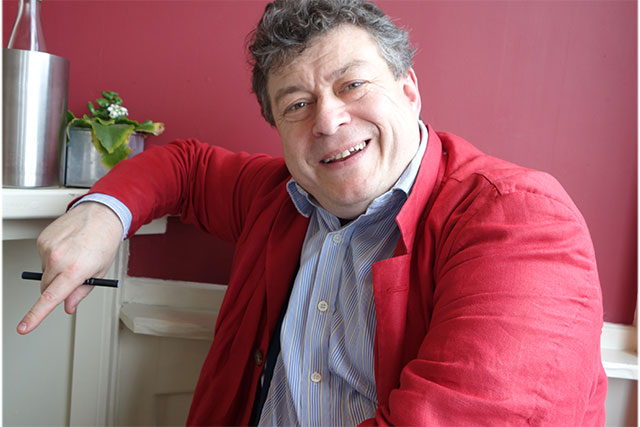One of the things that Julia Peyton-Jones and I try to do with the Serpentine Gallery Marathons, on which we've collaborated with Edge many times, is to provide a format that isn't like a normal conference: it takes place over 24 or 48 hours. And it happens in the Serpentine Gallery Pavilion, so this creates a connection between art and architecture. And then one connects to all the other disciplines through the invited speakers. It's a kind of knowledge festival. The marathon is a hybrid. It's a group show, because artists are doing performances, but they're given time and not space. But it's also a conference because there are lectures and presentations. This year's Marathon, which takes place at The Serpentine Gallery the weekend of October 18-20, will be about "Extinction".

(37:55 minutes)
Introduction
by John Brockman
Hans Ulrich Obrist is Co-director of the Serpentine Galleries, and the initiator of numerous international art projects and exhibitions. One example is the current Serpentine event (through August 14th), a new durational performance by Marina Abramović entitled "Nothing" in which the artist is in residence for 512 hours.

It is for this kind of signature event that, in 2009, HUO was ranked #1 in Art Review's annual "Art Review Power 100" list of the contemporary art world’s most powerful figures, and #2, #2, #5, in 3 out of the past 4 years. It is a measure of his unique stature, that in today's contemporary art world, one that often seems dominated by money, HUO, who, in the 25 years I've known him, has never mentioned money, prices, or the art market, is arguably the contemporary art world's most influential figure.
"I don't talk about the art market", he explains, "as I don't know much about it. It's not part of my work. I have always worked on public exhibitions towards the end of making the best work accessible for everyone. As Gilbert and George say, 'art for all'."
What interests him is the exhibition as ritual. "A crowd of people is not a crowd but rather a number of individuals gathered in a space who are, contra the experience of an opera or a theatrical performance, not subject to a collective control of attention....Attention is neither monopolized nor homogenized. The exhibition is a very democratic and liberal ritual where the viewer decides the duration of his or her stay. "
I recently visited HUO at his office at the Serpentine Gallery to talk about the forthcoming "Marathon" on "Extinctions," an event that bridges the humanities and the sciences alike. "The spectre of extinction looms over the ways in which we understand our being in the world today," he says. "In response, artists and writers embed these concerns into the products of their creative endeavours. Environmental degradation, genocide, atomic weapons, threats to small, isolated communities, threats to languages, global warming economics and extinction, catastrophes in nature, life wiped out by disease and hunger—the constellation of topics around extinction is ever-expansive and as urgent now as ever before".
Some of the questions on the agenda for the participants to explore include "What is extinction and what are we losing? How do we understand loss and endings? How can an individual understand themselves in relation to a collective responsibility? What is the artist’s role in responding to mass extinction? What happens after the end has come and gone? How can artists, scientists and thinkers imagine new visions of the future? How has the spectre of extinction come to inform artistic and literary practice?" Edge once again plans to be there, collaborating with HUO as in previous marathon events: Maps For The 20th Century, Information Gardens, Formulae For The 21st Century, Table-Top Experiments Marathon.









